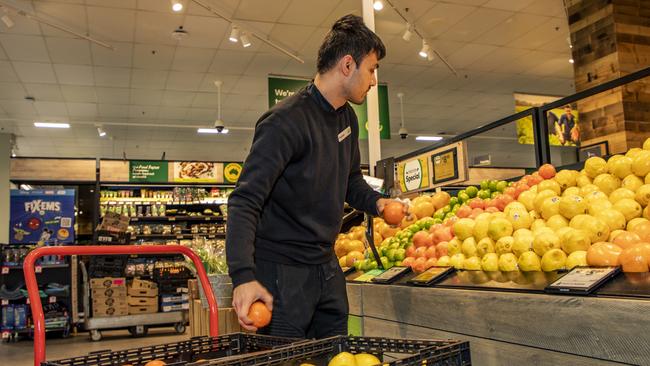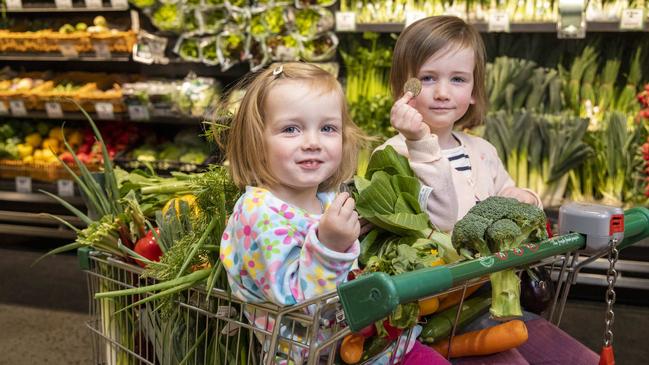Woolworths boss Brad Banducci said shoppers are hunting for value as cost of living pressures bite
Woolworths chief executive Brad Banducci says younger families, singles and couples remain resolutely focused on value for money as cost-of-living pressures tighten household budgets.
Woolworths chief executive Brad Banducci says younger families, singles and couples remain resolutely focused on value for money as cost-of-living pressures tighten household budgets, with sales in discretionary categories across the supermarket aisle and at his Big W chain under pressure.
This cost-of-living pressure on particular customer segments was also accelerating as the wave of interest-rate hikes since last year started to feed into higher mortgage repayments while soaring inflation – although moderating at the supermarket checkout in the first quarter – made shoppers think more about what they buy.
That pressure on consumers is still building, and as Mr Banducci was presenting the supermarket giant’s latest quarterly sales on Wednesday the likelihood of a Melbourne Cup Day rate hike became stronger after surging petrol prices, rents and power bills caused inflation to accelerate.
New data showed inflation in the September quarter was running at 1.2 per cent from 0.8 per cent in the June quarter. While fruit, vegetable and meat prices might have dropped, that was countered by other pain points for consumers in weekly expenses.
Mr Banducci pointed to evidence of shoppers turning more frugal in the face of these pressures, saying buying patterns around Halloween, the last big celebratory event before Christmas, had seen spooky costumes and other “big-ticket items” slow to sell, but cheaper “everyday” items such chocolates and small treats were trading strongly. But Mr Banducci remained optimistic for the crucial Christmas trading period, despite shoppers being discerning in what they place in their basket as they keep one eye on their bank balances.
“Every (customer) segment is looking for value. It is a very value-conscious market right now,” he said.
“We are still 63 days away from Christmas, which is a long time … and we expect our customers to be very discerning. But actually, we feel very comfortable that we’ve got great value, in particular our own-brand range which is starting to roll out into our stores, and some really exciting items there that if we want to we can come back a bit later.
“We feel very optimistic, families like to entertain collectively at Christmas, that is universally true … they will look for value, and we look forward to providing it.”

“We propose to vote in accordance with the (Endeavour) board’s recommendations, supporting the board and management team of Endeavour Group and their plans to deliver long-term shareholder value,” Mr Banducci said.
The decision means it will be almost impossible for Mr Wavish to be elected to the Endeavour board, despite having the support of 15 per cent shareholder, pubs billionaire Bruce Mathieson Snr. It is expected that AustralianSuper, which has a 7.5 per cent stake in Endeavour, will also vote against Mr Wavish’s board bid.
Meanwhile on Wednesday, Woolworths reported first-quarter sales of $17.22bn, up 5.3 per cent, slightly below market forecasts of sales growth of around 5.5 per cent to $17.3bn, as inflation continued to moderate across the supermarket aisle to bring relief to customers.
In its first-quarter sales update, Woolworths said deflation was driven by lower prices in fruit and vegetables and meat, as lower input costs in these categories led to lower retail prices.
Woolworths said group sales remained solid for the quarter, with customer trends remaining broadly in line with the prior quarter with overall demand resilient.
However, Mr Banducci said the retailer was seeing its customers, particularly families, young singles and couples “ever more” focused on value in all forms which has affected customer ratings of Woolworths when it comes to prices.
Its “voice of the customer” net promoter score fell 3 points to 47 points in the quarter.
Mr Banducci said there had been a slowdown in discretionary categories, for both Woolworths and its discount department store Big W.
“People are making very conscious choices right now about how they spend money, and we see it, and each customer segment has a slightly different narrative to the choices they make, and it has been happening for a while and obviously accelerating given the pressures we see,” he said.
This search for value also saw shoppers increasingly choosing supermarket own-brand items from the shelf, with Woolworths food company and own and exclusive brand sales up 7.8 per cent for the quarter.
For more than a year, Australian shoppers have been under pressure from the twin forces of rising interest rates and soaring inflation, although that inflationary pressure was starting to retreat.

Woolworths said average prices in the first quarter lifted 2 per cent compared to the prior year, with the moderation compared to previous quarters primarily as a result of deflation in fruit and vegetables and meat.
Excluding tobacco, fruit and vegetables, average prices increased by 4 per cent with some moderation in long-life categories. Fruit and vegetables’ average prices declined by approximately 12 per cent due to improved growing conditions, with berries, lettuce, cucumbers, capsicum and tomatoes all declining materially.
Mr Banducci said the runway into the key Christmas trading period was consistent with what the retailer had witnessed through the first quarter. Shoppers were squarely focused on value for money given the cost of living pressures.
“Looking ahead, we have strong plans in place for the key Christmas and holiday trading period and while sales trends in October to date have remained broadly in line with the trend lines in the first quarter, the trading environment remains uncertain and value for money remains a key focus for our customers across all our businesses.”
In its flagship Australian supermarkets, sales increased by 6.4 per cent to $13.08bn, with sales growth largely consistent over the quarter with higher item growth offset by a moderation in inflation. The bounce in retail sales for its supermarkets arm was 7.6 per cent if tobacco was excluded, with volume growth up mainly driven by increased demand for fruit and vegetables and meat due to lower prices and improved availability.
The retailer said e-commerce sales of $1.96bn were up 16 per cent against the first quarter of 2023. Big W sales fell by 5.5 per cent to $1.13bn.
At its troubled New Zealand supermarkets arm, food sales increased by 2.8 per cent but with a slowing trend throughout the quarter, due to lower inflation an item declines driven by a very challenging economic environment and competitive landscape which included the opening of a maiden Costco store in the country.
Woolworths warned that at this stage, its New Zealand supermarket first-half earnings are expected to be below the second half of 2023 and the prior year.







To join the conversation, please log in. Don't have an account? Register
Join the conversation, you are commenting as Logout